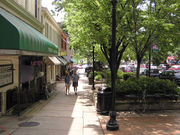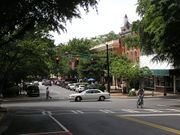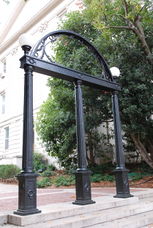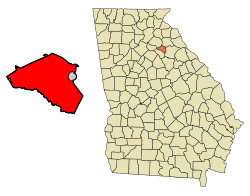Athens, Georgia
Athens-Clarke County is a unified city-county in Georgia, U.S., in the northeastern part of the state. The University of Georgia is located in this college town and is responsible for the initial growth of the city. In 1991, after a vote the preceding year, the original city abandoned its charter in order to form a unified government with Clarke County, referred to collectively as Athens-Clarke County.[2] As of the 2000 census, the consolidated city-county (including all of Athens-Clarke County except Winterville and a part of Bogart) had a total population of 100,266. However, the most recent US Census estimate (2009) placed the population at 114,983. Athens-Clarke County is the fifth-largest city in Georgia and the principal city of the Athens-Clarke County, Georgia Metropolitan Statistical Area,[3] which had a population of 189,264 as of the 2008 Census Bureau estimate.[4]
History
Downtown Athens, looking down College Avenue towards Broad Street
The first buildings on the University of Georgia campus were made from logs. The town grew as lots adjacent to the college were sold to raise money for the additional construction of the school. By the time the first class graduated from the University in 1804, Athens consisted of three homes, three stores and a few other buildings facing Front Street, now known as Broad Street. Completed in 1806 and named in honor of Benjamin Franklin, Franklin College was the University of Georgia and the City of Athens' first permanent structure. This brick building is now called Old College. 
Downtown Athens on a Sunday morning in May
During the American Civil War, Athens became a significant supply center when the New Orleans armory was relocated to what is now the called the Chicopee building. Fortifications can still be found along parts of the North Oconee River between College and Oconee St. In addition, Athens played a small part in the ill-fated Stoneman Raid when a skirmish was fought on a site overlooking the Middle Oconee River near what is now the old Macon Highway. Like many southern towns, Athens still hosts a confederate memorial that is located on Broad St, near the University of Georgia Arch. During Reconstruction, Athens continued to grow. The form of government changed to a mayor-council government with a new city charter on August 24, 1872 with Captain Henry Beusse as the first mayor of Athens. Henry Beusse was instrumental in the rapid growth of the city after the Civil War. After holding the position of mayor he worked in the railroad industry and helped to bring railroads to the region creating growth in many of the surrounding communities. Freed slaves moved to the city, many attracted by the new centers for education such as the Freedman's Bureau. This new population was served by three black newspapers – the Athens Blade, the Athens Clipper, and the Progressive Era. In the 1880s as Athens became more densely populated city services and improvements were undertaken. The Athens Police Department was founded in 1881 and public schools opened in fall of 1886. Telephone service was introduced in 1882 by the Bell Telephone Company. Transportation improvements were also introduced with a street paving program beginning in 1885 and streetcars, pulled by mules, in 1888. 
Broad Street in Downtown Athens near North Campus of the University of Georgia
During World War II, the U.S. Navy built new buildings and paved runways to serve as a training facility for naval pilots. In 1954, the U.S. Navy chose Athens as the site for the Navy Supply Corps school. The school was located in Normal Town in the buildings of the old Normal School. The school is now scheduled to be moved in 2011 under the Base Realignment and Closure process. In 1961, Athens witnessed part of the civil rights movement when Charlayne Hunter and Hamilton Holmes became the first two black students to enter the University of Georgia. Three years later, Athens was witness to the murder of Lemuel Penn, who was followed out of town and murdered in Madison County near Colbert, Georgia. Despite the Brown vs. Board of Education Supreme Court ruling in 1954, the Athens – Clarke County school district remained segregated until 1970. Geography and climateAccording to the United States Census Bureau, the balance has a total area of 118.2 square miles (306.1 km2), of which 117.8 square miles (305.1 km2) is land and 0.5 square miles (1.3 km2) (0.41%) is water.
Neighborhoods
Government
PoliticsThe Human Rights Festival, held annually, has brought in speakers and activists such as Jesse Jackson, David Dellinger and William Ayers. The first Really Really Free Market was held April 28, 2007 as part of the May Day celebrations organized by Autonomous Athens.[7] Since then, several more have been held. DemographicsAs of the census[1] of 2000, there were 100,266 people, 39,239 households, and 19,344 families residing in the city. The population density was 851.5 people per square mile (328.8/km²). There were 41,633 housing units at an average density of 353.6/sq mi (136.5/km²). The racial makeup of the city was 64.71% White, 27.37% Black or African American, 0.21% Native American, 3.15% Asian, 0.04% Pacific Islander, 3.11% from other races, and 1.41% from two or more races. Hispanic or Latino of any race were 6.39% of the population. There were 39,239 households out of which 22.3% had children under the living with them, 32.3% were married couples living together, 13.3% had a female householder with no husband present, and 50.7% were non-families. 29.9% of all households were made up of individuals and 5.8% had someone living alone who was 65 years of age or older. The average household size was 2.35 and the average family size was 2.95. In the city the population was spread out with 17.8% under the , 31.6% from 18 to 24, 27.3% from 25 to 44, 15.3% from 45 to 64, and 8.0% who were 65 years of age or older. The median age was 25 years. For every 100 females there were 95.4 males. For every 100 females age 18 and over, there were 93.4 males. The median income for a household in the city was $28,118, and the median income for a family was $41,407. Males had a median income of $30,359 versus $23,039 for females. The per capita income for the balance was $17,103. About 15.0% of families and 28.6% of the population were below the poverty line, including 25.2% of those under age 18 and 13.5% of those age 65 or over. EconomyBusinesses
Downtown Athens at the intersection of Clayton St. and College Avenue
TourismEvery spring there are bicycle races collectively known as the Twilight Series. One is the Twilight Criterium. In addition to its yearly weekend of bike events, Athens has a bicycle culture, observed the first Friday of each month at Courteous Mass (sponsored by BikeAthens) and the last Friday of each month at Critical Mass (an independent gathering). CultureCulture coexists with the university students in creating an art scene, music scene and intellectual environment. The city has music venues, restaurants, bars, and coffee shops that cater to its creative climate. Unusual local features
Notable local gardens
Notable local bars
Notable local businessesNetwork Translations, Inc. developed here. It produced the PIX firewall which was later purchased by Cisco Systems. Notable film and TV appearancesThe 1940 film The Green Hand was shot in Athens, using local townspeople and students and faculty from the University of Georgia as its cast. The film had its premiere in Athens in January 1940, in an event attended by Governor Eurith D. Rivers. The movie, Darius Goes West, was shot in Athens.[9] The short lived 1980–81 ABC-TV television series Breaking Away (based on the 1979 film of the same name) was filmed in and around Athens, and made use of the University buildings, and local stone quarries for filming locations. MusicMain article: Music of Athens, Georgia
The Athens music scene grew in the early 1970s with Ravenstone along with the Normaltown Flyers at Allen's[10] and later during the 1980s with the Georgia Theatre and 40 Watt Club as the bands R.E.M. and the B-52's scored breakout hits. The original Allen's was one of the oldest bars in Athens. It closed in 2004 and re-opened in 2007 at a new location. Other notable bands were Dreams So Real, Indigo Girls, Matthew Sweet, The Method Actors, Love Tractor, Pylon, Flat Duo Jets, The Primates, Modern Skirts, The Whigs, and Widespread Panic. National acts that have come out of Athens include: Deerhunter, Christian power metal band Theocracy, The Whigs, Danger Mouse, Dreams So Real, alternative duo Jucifer, Vic Chesnutt, Drive-By Truckers, Elf Power, Neutral Milk Hotel, The Sunshine Fix, Bubba Sparxxx, The Olivia Tremor Control, Of Montreal, Five Eight, Dead Confederate, King of Prussia, Jet by Day, Athens Boys Choir, and R.E.M. R.E.M. members Michael Stipe, Mike Mills and Bill Berry still maintain residences in Athens. Every Summer since 1996 the city has hosted AthFest, a non-profit music and arts festival held in the downtown area.[11] MediaAthens Banner-Herald publishes daily. UGA has an independent daily newspaper, The Red & Black. Flagpole Magazine is an alternative newspaper publishing weekly. The Classic City Courier is an online newspaper[12] published weekly. Local radio stations include:
The formerly defunct station serving the Athens area—WBKZ 880 AM—now operates as a radio station with an African-American focus. In addition, WFSH-FM 104.7 FM, a contemporary Christian music station, is licensed to Athens but based in Atlanta. Atlanta-based Rhythmic Top 40 station WBTS (95.5 The Beat) was formerly licensed to Athens (and also the former home of country station WNGC, which now broadcasts at 106.1) but has since changed its city of license to Doraville, Georgia. Television Channel 8, WGTV and channel 34, WUVG are both licensed to Athens. However their transmitters are in the Atlanta metropolitan area. WGTV broadcasts from the top of Stone Mountain. Moreover, because of Stone Mountain, the line of sight from other Atlanta broadcast television stations, such as WSB-TV, is blocked or at least hindered. EducationClarke County School DistrictThe Clarke County School District supports grades pre-school to grade twelve. The district consists of fourteen elementary schools, four middle schools, and three high schools (one non-traditional).[13] The district has 791 full-time teachers and over 11,457 students.[14] Private schools

The Arch in Downtown Athens
Colleges and universities
InfrastructureTransportationRoadsThe city is the focus of U.S. Highways 29, 78, 129, Georgia 72, and 441, and near the eastern terminus of Georgia 316 and the southern terminus of State Route 106. The Georgia State Route 10 Loop serves as a limited access perimeter. The city is bisected East to West by Broad St/Atlanta Highway and North-South by Milledge Avenue. College Station Rd and Gaines School Rd are major thoroughfares on the east side of Athens. Lumpkin St, Prince Ave, North Ave, and Oconee St are major thoroughfares radiating from Downtown (Athens). BusAthens Transit provides intracity transit 6 days per week.[18] UGA Campus Transit provides fare-free transit around the University of Georgia campus and Milledge Avenue.[19] Southeastern Stages, a subsidiary of Greyhound Lines provides intercity bus services.[20] RailAthens has no direct passenger rail service; the closest Amtrak stations are located in Atlanta, Gainesville, and Toccoa. Freight service is provided by CSX[21] and Athens Line,[22] the latter having leased tracks from Norfolk Southern. The Georgia Department of Transportation has proposed the city as the terminus of a commuter line that links Atlanta and Gwinnett County along the Georgia 316 corridor.[23] AirAthens-Ben Epps Airport has been operational since 1917. It is located east of downtown outside the Perimeter and north of US Highway 78. Currently, Georgia Skies and Wings Air provide commercial air service to Atlanta, and until 2008, US Airways provided service to Charlotte. Atlanta's Hartsfield-Jackson International Airport is also a primary point of departure and arrival for Athenians.[24] AlternativeAthens encourages use of alternative transportation. Bike lanes are provided on major thoroughfares. A rail-to-trail redevelopment is being considered to connect Downtown (Athens) with the East-Side. Organizations such as BikeAthens support and encourage biking. Skateboarding and small scooters are also common sights around UGA campus and Downtown. UtilitiesAthens electricity utility is provided directly by Georgia Power, a subsidiary of Southern Company. Water utility is provided by the city. Garbage is provided by private companies according to customer purchase, though the city does offer municipal garbage pick up as a service. Sister citiesAthens has three sister cities.[25] Notable residents and natives
References
External links
|
|||||||||||||||||||||||||||||||||||||||||||||||||||||||||||||||||||||||||||||||||||||||||||||||||||||||||||||||||||||||||||||||||||||||||||||||||||||||||||||||||||||||||||||||||||||||||||||||||||||

